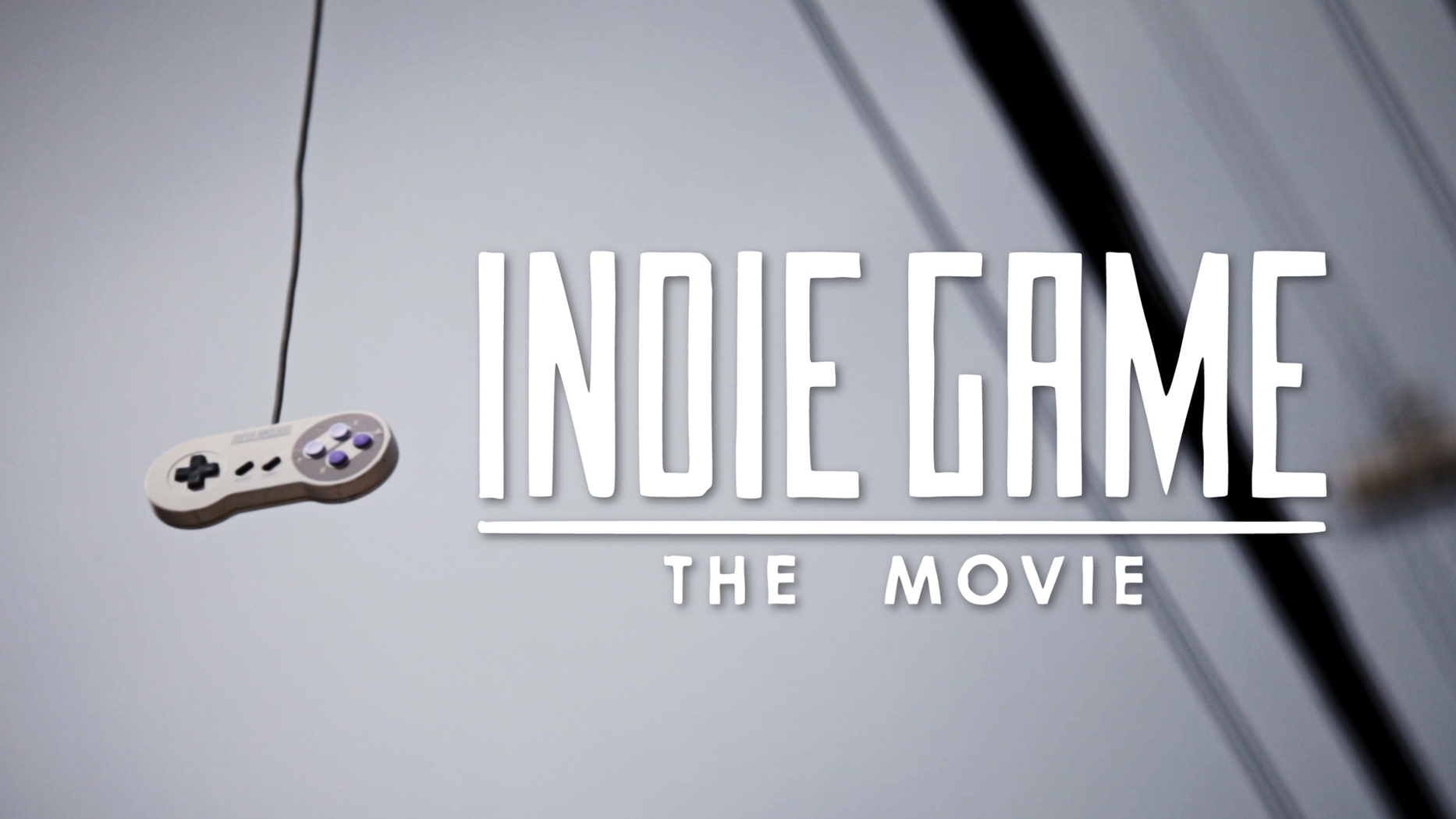Hey there. This is my first film review for CHUD. Here. We. Go.
Kickstarter is a powerful weapon these days when it comes to the arts. Generating revenue for your feature film, documentary, video game, sculpture, whatever, has become infinitely easier to do. The concept of crowdsourcing surrounds the new game from Double Fine, a point and click adventure title, as well as remakes of Leisure Suit Larry and other titles.
Such is the case with Indie Game – The Movie, which took Kickstarter by storm, raising over twenty thousand dollars in an attempt to offer audiences a glimpse into the development of three independent video games released within the past few years. The story of Super Meat Boy, a nightmare-enducing, hyper kinetic platformer from Edmund McMillen and Tommy Refenes is chronicled, as well as a nice portion of the difficulty surrounding Phil Fish’s Fez (which saw release only recently after missing multiple XBOX milestones). Phil Fish is perhaps the “star” of the film, as he gives the juiciest answers to questions posed by Lisette Pajot and James Swirsky, the directors and isn’t afraid to say something inflammatory about his former partner at Polytron.
To briefly go over the protracted development of Fez, a perfect storm of personal and business-related trauma happened to Fish. His father was diagnosed with Leukemia, his girlfriend left him, his parents divorced, his partner began litigation against him, and the money began to drop out. All of these things are discussed in the film, and truly give the viewer a more personal view of the events, as opposed to reading about why Fez took so long to arrive on the XBOX 360.
Jonathan Blow, creator of Braid, the now-legendary 2-D platforming take on love and loss is featured, which was nice to see, as I’m a huge fan of the man, regardless of how much of a jerk he appears to be. In the film, we get to sympathize with him as he discusses how a lot of people missed the point of Braid, saying that his deepest flaws and vulnerabilities are in the game. It’s interesting to see the artist talk about his work in such a candid way, and while Blow has certainly never shied away from talking about game development (and his seeming disdain for the modern trends associated with it), he takes a far more personal stance this time around.
Super Meat Boy’s creators are truly the underdogs in the film, working tirelessly and discussing their game at a far deeper level than could perhaps be seen on the surface. McMillen describes Meat Boy as completely vulnerable to a harsh world, with Bandage Girl (the object of Meat Boy’s affections) being the only thing that makes him whole, so, of course, when she’s taken by Dr. Fetus, he sets out on a perilous journey to get her back. The fragility of life itself is on display in Super Meat Boy, where the player can only learn through the destruction of themselves, reaching the ultimate goal of becoming one. A metaphor for love, perhaps more obvious than Braid, but charming and fun nonetheless.
The film is shot beautifully, with the camera lingering on the chilly Montreal landscape (where Phil Fish worked on Fez), as well as a positively dreary-looking North Carolina (home of insulin-shooting Tommy Refenes). Moments of despair by both of these gentlemen are reflected nicely in the direction, with Phil Fish bordering on frenzy for nearly the entire film’s ninety minute runtime. Refenes reflects on the things in his life that are taking a back seat during the development of Super Meat Boy, including socializing with friends, as well as dating. McMillen and Refenes are so fun to root for because they seem like genuinely nice dudes just looking to do right by their loved ones and deliver a game that everyone can enjoy in some fashion.
Blow serves almost as the inspiration for these other developers, though they never explicitly say so. Success for McMillen and Refenes with Super Meat Boy is measured against Braid upon release, as Braid sold upwards of fifteen thousand copies on its first day of release. Super Meat Boy hits those numbers and goes beyond that, with McMillen jokingly saying to Refenes (during a Skype call) “Hey, remember that game Braid?” It’s a triumphant moment seeing these two men succeed, knowing how hard they both worked and how deeply passionate they are about game development. While they never have the ridiculous setbacks that Fish has during the making of Fez, they still face potential personal failure, as well as failure on the behalf of Microsoft, who is the fifth character in the film. The omnipresent corporation pressuring the Super Meat Boy team into nailing some kind of nebulous release frame, then drops the ball themselves by not putting Super Meat Boy on the marketplace front page, thus potentially ruining sales for both parties.
As an indie game developer, I’ve seen the release of a few titles on the indie game marketplace. I’ve seen sales numbers, I’ve seen trends come and go. I understand (at a small level, at least) the frustration of not having your game on the marketplace front page. This basically eliminates any chance of advertising. Basically, the concept laid out in the film by a stressed-out Refenes (upon seeing that Super Meat Boy is not given front page listing, which was part of the deal Microsoft proposed) is that “it’s like going into a store and asking if they have a copy in the back.”
Interestingly, all four men have seemingly left Microsoft behind upon completion of their games. The Super Meat Boy team has worked on separate titles, though are supposedly working on a game again, in its early stages, with, as of this writing, no plans for an XBOX release. Jonathan Blow is currently working on The Witness, which is a 3D puzzle game scheduled to be released for Windows and iOS devices, skipping the XBOX 360 altogether. Phil Fish has cited that there are difficulties in working with the Xbox Live Arcade, so he’s moving on, as well, and is looking to perhaps utilize Kickstarter for his next project.
Altogether, the stories of these game developers, the trials and tribulations of working on a deadline, the missing of milestones, personal triumphs and failures are all part of what makes Indie Game – The Movie required viewing for any person with even a passing interest in video games and their development. It helps that the film is shot with a diamond-cutter’s eye, with sharp, lush visuals utilizing in-game footage of the various games, contrasted against real-world events. I had been waiting for this one for a while, and I’m happy to say, I absolutely loved it.
The film is playing in select cities, and as of this writing, showing 7 times a day at the IFC Center, which is where I caught it.
Rating:





Out of a Possible 5 Stars

